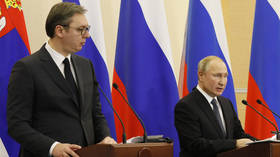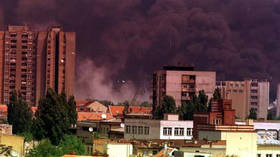Putin would’ve prevented NATO bombing of Yugoslavia – Serbia’s president

Serbia’s President Aleksandar Vucic has said that he stands by his earlier claim that Vladimir Putin would not have allowed NATO to bomb Yugoslavia in 1999 if he had been in power in Moscow at that time.
During talks with his Russian counterpart in Sochi in 2019, Vucic said “we in Serbia value Putin more than other leaders [of Russia]… If Putin was making decisions in Russia in 1999, nobody would’ve bombed us.”
In his interview for the documentary ‘Belgrade,’ which was dedicated to the 25th anniversary of the start of the NATO airstrikes and aired on the television channel Russia 1 on Sunday, the Serbian leader was asked to comment on that claim.
“I said what I think. Every person in this country [Serbia] thinks the same,” Vucic replied.
“Some former leaders of Russia used to impose sanctions against us three days after the Americans did,” he said, referring to Boris Yeltsin, who was president between 1991 and 1999.
On March 24, 1999, the US and its allies launched airstrikes against what was then Yugoslavia, after blaming Belgrade for the “excessive and disproportionate use of force” in addressing an ethnic Albanian insurgency in Kosovo. NATO warplanes carried out 900 sorties during the 78-day bombing campaign, which, according to Serbian government figures, killed 2,500 civilians, including over 80 children. The Western powers acted without authorization from the UN Security Council.
NATO “took advantage of this situation and found a way to bomb us in order to destroy our country, because there was no counterweight at the global level, there was no one who could then resist them,” the Serbian president explained.
The same documentary included Putin’s response to the suggestion by Vucic that he would’ve stopped the NATO bombing campaign in 1999; the Russian president stressed that “the situation in Yugoslavia was different. The country was in a state of a severe internal conflict.” Because of this fact, “it’s difficult to talk about it now,” he said.
“In any case, if we had a single ally [in the face of Yugoslavia], of course, we would have been building relations with that ally… If we had any obligations in our relations, then, of course, we would have fulfilled those obligations. Back then, there were no such relations between Russia and Yugoslavia,” Putin explained.
The Russian leader, who was first appointed Russia’s prime minster later in 1999, also said that the actions of the US and its allies that year were “completely unacceptable,” calling the NATO attacks on Yugoslavia “a huge tragedy.”













